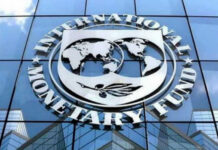Economy under stress for lack of reforms: CPD
The think tank also questions GDP growth without rise in private sector investment

A lack of good governance and reforms has put the Bangladesh economy under the most severe strain it has faced in the last decade, the Centre for Policy Dialogue said yesterday.
The fault lines in the economy are getting deeper and need to be fixed; otherwise the country’s economic growth cannot be sustained in the coming years.
The observations were made at the launch of the think tank’s “State of the Bangladesh Economy in fiscal 2019-20” report at Cirdap in the capital.
The Centre for Policy Dialogue (CPD) identified four areas — banking, revenue mobilisation, capital market and balance of payments — where the fault lines have been exposed in recent months.
A rapidly increasing trend of defaulted loans, a potential risk of large revenue shortfall in the target set by the National Board of Revenue, the ongoing problems in the capital market and crisis stemming from balance of payments pose major challenges to macroeconomic stability.
The think tank also questioned the country’s eight percent plus GDP growth, saying it came without a proportionate rise in private sector investments.
“The ratio of private investment to GDP has been hovering around 23 percent for the last few years. But the GDP growth gradually increased to eight percent from five to six,” Debapriya Bhattacharya, distinguished fellow of the CPD, said.
The GDP growth declared by the government did not match the information available, he said.
Pointing to the problems, he said private sector credit growth had plummeted to 10 percent in August due to a liquidity crunch in the banking sector.
The import of capital machinery had also registered a negative growth in the recent months, he said.
“The capital market has been facing a big crisis in the recent months, at a time when revenue mobilisation has also fallen.”
There has been a question of how the high GDP was achieved despite the problems faced by the economy, the economist said.
Criticising the government is not CPD’s motive, rather it is to help the government implement the fiscal budget, he said.
Debapriya also said the financial sector is yet to see any reforms. The government was trying to resolve the crisis by giving incentives.
“An addiction to incentives has been created inside the economy,” he said, adding that the government’s capacity to offer incentives would weaken if the trend continued.
The global economy is going towards a structural recession and only reforms in the financial sector will protect Bangladesh from the upcoming depression, he said.
Debapriya also said the steps being taken to deal with financial crimes may not be enough.
The government is conducting raids at casinos in order to stop corruption, but there was a limitation here, he said, adding that those investing in casinos were involved in dodging taxes, money-laundering and siphoning off money from banks.
Only reform programmes in the financial sector can stop such corruption, he said, adding political decision from the highest level of the government was needed for those.
But a vested interest has created a barrier to reforming the economy as they were benefiting from the fragility in the financial system.
On the banking sector, CPD Executive Director Fahmida Khatun said increasing non-performing loans (NPLs) were eroding people’s confidence in the banking sector.
The NPLs stood at Tk 112,430 crore, which was 11.69 percent of total loans, as of June this year. Quoting the International Monetary Fund’s recent report, she said such stressed assets of the banking sector would be more than Tk 2 lakh if written-off loans and the amount pending with the court cases are taken into account.
Besides, low interest rates are putting off depositors. The interest rate on deposits is almost zero percent if adjusted for inflation, she said.
The situation has arisen from the decision to cap interest rate on deposits at 6 percent, she said.
The inflation rate was 5.54 percent in September.
Fahmida also expressed concern about the deteriorating conditions of the private banks, similar to those of state banks.
The central bank has recently taken some policy measures, which had an adverse impact on the banking sector and is hampering its progress as well, she said.
The existing GDP growth will not continue in the medium term if the crisis in banking sector persists, the economist said.
Identifying another area of concern, Mustafizur Rahman, another CPD fellow, said the country’s foreign exchange reserve to cover the import bills had been declining for the last few months, which was not a good sign.
Besides, the overall balance in the external sector stood at $12 million, much lower than $5,459 million target set by the seventh five-years plan.
Bangladesh is falling behind its major competitors in the key market of the US, he said.
The country’s export growth in the US in the first two months of the fiscal year was 3.1 percent, whereas Cambodia posted a growth of 8.20 percent, China 4.90 percent, Turkey 10.30 percent and Vietnam 11.70 percent. The government should take steps to strengthen the capacity of exporters by depreciating local currency, Rahman said.
Towfiqul Islam Khan, a senior research fellow at the CPD, said that the growth in revenue collection in the first quarter of the fiscal year was one of the lowest in the decade.
The NBR set a revenue collection of Tk 325,600 crore, up 45 percent from a year ago.
But, it faced a shortfall of Tk 14,906.80 crore from its desired target for the first quarter of FY2020, he said.
The government should change its stance to offer tax rebates, he said.
Its borrowing from the banking sector will increase significantly if revenue mobilisation cannot be increased as expected, he added.









